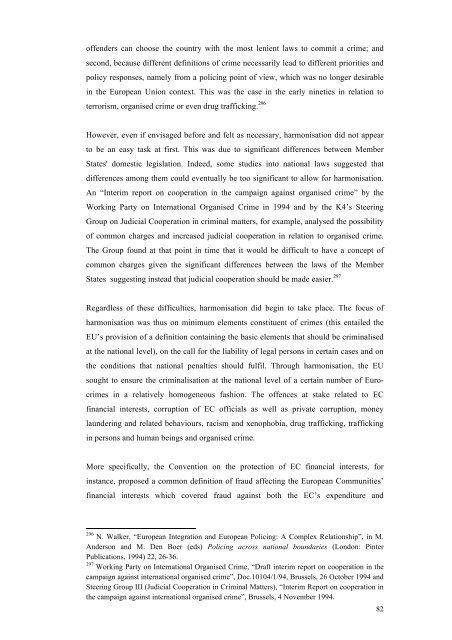The evolution of European Union criminal law (1957-2012)
The evolution of European Union criminal law (1957-2012)
The evolution of European Union criminal law (1957-2012)
You also want an ePaper? Increase the reach of your titles
YUMPU automatically turns print PDFs into web optimized ePapers that Google loves.
<strong>of</strong>fenders can choose the country with the most lenient <strong>law</strong>s to commit a crime; and<br />
second, because different definitions <strong>of</strong> crime necessarily lead to different priorities and<br />
policy responses, namely from a policing point <strong>of</strong> view, which was no longer desirable<br />
in the <strong>European</strong> <strong>Union</strong> context. This was the case in the early nineties in relation to<br />
terrorism, organised crime or even drug trafficking. 296<br />
However, even if envisaged before and felt as necessary, harmonisation did not appear<br />
to be an easy task at first. This was due to significant differences between Member<br />
States' domestic legislation. Indeed, some studies into national <strong>law</strong>s suggested that<br />
differences among them could eventually be too significant to allow for harmonisation.<br />
An “Interim report on cooperation in the campaign against organised crime” by the<br />
Working Party on International Organised Crime in 1994 and by the K4’s Steering<br />
Group on Judicial Cooperation in <strong>criminal</strong> matters, for example, analysed the possibility<br />
<strong>of</strong> common charges and increased judicial cooperation in relation to organised crime.<br />
<strong>The</strong> Group found at that point in time that it would be difficult to have a concept <strong>of</strong><br />
common charges given the significant differences between the <strong>law</strong>s <strong>of</strong> the Member<br />
States suggesting instead that judicial cooperation should be made easier. 297<br />
Regardless <strong>of</strong> these difficulties, harmonisation did begin to take place. <strong>The</strong> focus <strong>of</strong><br />
harmonisation was thus on minimum elements constituent <strong>of</strong> crimes (this entailed the<br />
EU’s provision <strong>of</strong> a definition containing the basic elements that should be <strong>criminal</strong>ised<br />
at the national level), on the call for the liability <strong>of</strong> legal persons in certain cases and on<br />
the conditions that national penalties should fulfil. Through harmonisation, the EU<br />
sought to ensure the <strong>criminal</strong>isation at the national level <strong>of</strong> a certain number <strong>of</strong> Eurocrimes<br />
in a relatively homogeneous fashion. <strong>The</strong> <strong>of</strong>fences at stake related to EC<br />
financial interests, corruption <strong>of</strong> EC <strong>of</strong>ficials as well as private corruption, money<br />
laundering and related behaviours, racism and xenophobia, drug trafficking, trafficking<br />
in persons and human beings and organised crime.<br />
More specifically, the Convention on the protection <strong>of</strong> EC financial interests, for<br />
instance, proposed a common definition <strong>of</strong> fraud affecting the <strong>European</strong> Communities’<br />
financial interests which covered fraud against both the EC’s expenditure and<br />
296 N. Walker, “<strong>European</strong> Integration and <strong>European</strong> Policing: A Complex Relationship”, in M.<br />
Anderson and M. Den Boer (eds) Policing across national boundaries (London: Pinter<br />
Publications, 1994) 22, 26-36.<br />
297 Working Party on International Organised Crime, “Draft interim report on cooperation in the<br />
campaign against international organised crime”, Doc.10104/1/94, Brussels, 26 October 1994 and<br />
Steering Group III (Judicial Cooperation in Criminal Matters), “Interim Report on cooperation in<br />
the campaign against international organised crime”, Brussels, 4 November 1994.<br />
82
















